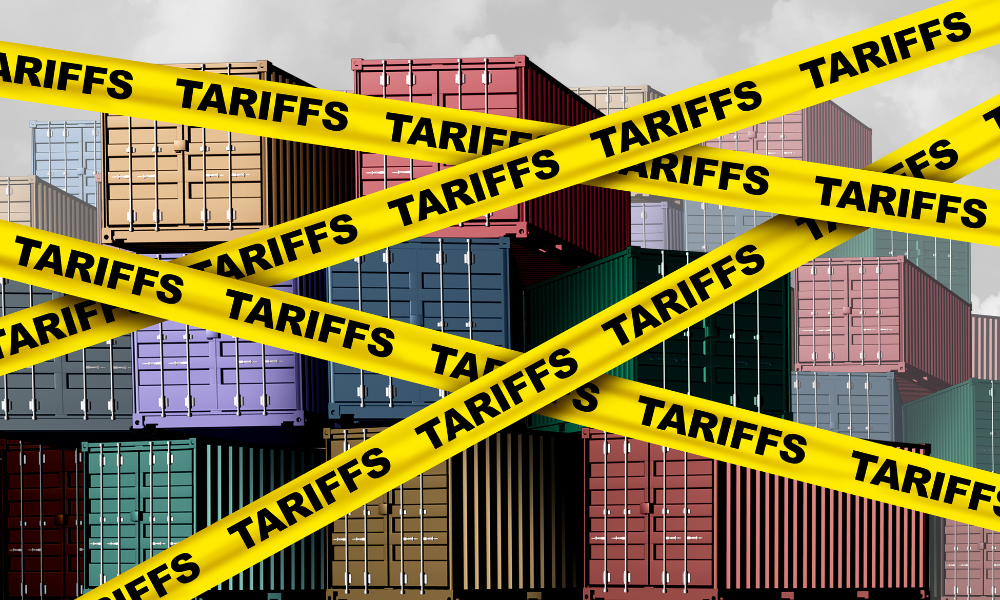

by Alex Longley and Priscila Azevedo Rocha
Commodities from oil to industrial metals to grains slipped as President Donald Trump’s tariff onslaught ratcheted up a trade war that threatens to hurt the global economy and demand for raw materials. Gold steadied after hitting a fresh record high.
The levies were seen as more aggressive than expected, with a 10% duty on all exports to the US and even higher rates on about 60 nations. While a swath of commodities — including energy, steel and aluminum - were exempted, there are mounting concerns about a broader hit to consumption, with major trading partners China and the European Union both vowing countermeasures.
Brent crude futures fell as much as 3.6% in London, benchmark European gas touched a three-week low and copper shed as much as 2.2%. Soybeans dropped on worries American crops will suffer from retaliatory measures, and cotton plunged by the exchange limit.
“The tariffs were bigger than expected,” said Giovanni Staunovo, a commodity analyst at UBS Group AG. “The question now is how other nations will respond, including whether we will see stimulus measures.”
Of particular concern in commodities markets will be the impact on China, the world’s top buyer of many raw materials. The country has already imposed tariffs on US farm products and there’s a risk the trade war could escalate. Canada and Mexico — key sources of crude for refiners in the Midwest and Gulf Coast — aren’t subject to the latest fees for now.
Oil, natural gas and energy products are among exempted goods, the White House said, sparing the direct impact on fuel markets. Still, crude has been whipsawed by Trump’s policy changes, tariffs and sanctions. The latest levies on imports vie with bullishness from tighter US restrictions on Russia and Iran, as well as OPEC+ reining in members that are producing above quota levels.
“The anticipated hit to demand because of tariffs also has a negative impact on crude, refined products and some extent natural gas demand, which is the main reason for the downward move on prices,” Rabobank strategist Florence Schmit said. “There is more at stake than meets the eye here as the future of the US LNG industry still hinges on large off-take agreements with buyers in Europe in Asia, who were just hit by sweeping tariffs.”
Metals are being handled under a separate “Section 232” tariff regime. Aluminum already has a blanket 25% fee on all US imports, while tariffs on copper are expected within weeks. Zinc, nickel, tin and a wide range of other commodities were also exempted from the country-specific tariffs, though they could be subject to Section 232 probes in future.
The threat of tariffs has caused major ructions in metals markets, with traders racing to ship billions of dollars of gold, silver and copper to the US before potential levies are imposed — and to take advantage of higher prices there.
While Trump has said he wants to impose specific tariffs on copper, the worry in precious metals markets was that they’d be ensnared by broader tariffs on all incoming goods. On Wednesday, the White House clarified that gold, silver and platinum-group metals will be exempt from the new reciprocal levies.
China is a key market for soybeans. If there is retaliation, the US may struggle to move its products to Asia, which is a major market for American grain and oilseed exports, said Ole Houe, chief executive officer at Sydney-based Ikon Commodities. China and other parts of Asia are also home to some of the world’s biggest cotton importers — which also export textiles back to the US.
Copyright Bloomberg News

Blue Anchor Capital Management and Pickett also purchased “highly aggressive and volatile” securities, according to the order.

Reshuffle provides strong indication of where the regulator's priorities now lie.

Goldman Sachs Asset Management report reveals sharpened focus on annuities.

Ahead of Father's Day, InvestmentNews speaks with Andrew Crowell.

Cerulli research finds nearly two-thirds of active retirement plan participants are unadvised, opening a potential engagement opportunity.
Barely a decade old, registered index-linked annuities have quickly surged in popularity, thanks to their unique blend of protection and growth potential—an appealing option for investors looking to chart a steadier course through today’s choppy market waters, says Myles Lambert, Brighthouse Financial.
How intelliflo aims to solve advisors' top tech headaches—without sacrificing the personal touch clients crave
